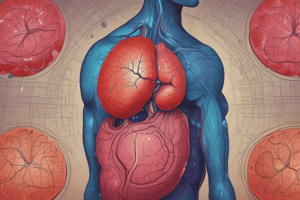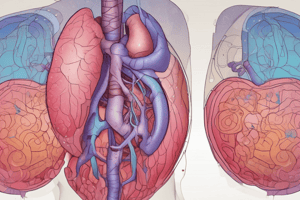Podcast
Questions and Answers
What is the primary purpose of liver function tests?
What is the primary purpose of liver function tests?
- To evaluate the progression of liver disease
- To diagnose primary liver diseases
- To assist in the differential diagnosis of icterus (correct)
- To monitor the response to therapy
Which of the following is a limitation of liver function tests?
Which of the following is a limitation of liver function tests?
- The tests can detect all liver diseases
- The tests can detect minor liver damage
- The tests are too sensitive
- The tests are lacking sensitivity (correct)
What is the classification of liver function tests based on?
What is the classification of liver function tests based on?
- The type of liver cell affected
- The type of disease
- The type of biochemical function (correct)
- The type of metabolic function
What is the primary function of the liver that is assessed by liver function tests?
What is the primary function of the liver that is assessed by liver function tests?
Which of the following is an indication for liver function tests?
Which of the following is an indication for liver function tests?
What is a potential problem with liver function tests?
What is a potential problem with liver function tests?
Which enzyme is measured in liver function tests?
Which enzyme is measured in liver function tests?
What is the significance of the liver's functional reserve?
What is the significance of the liver's functional reserve?
What is the purpose of the BSP clearance test in domestic animals?
What is the purpose of the BSP clearance test in domestic animals?
Which of the following is NOT a type of plasma protein?
Which of the following is NOT a type of plasma protein?
What is the primary reason for determining plasma proteins in animals?
What is the primary reason for determining plasma proteins in animals?
Which of the following enzymes is elevated in the serum due to disruption of hepatic cells as a result of necrosis?
Which of the following enzymes is elevated in the serum due to disruption of hepatic cells as a result of necrosis?
What is the purpose of the amino acid tolerance test?
What is the purpose of the amino acid tolerance test?
Which of the following is a test of protein metabolism and liver function?
Which of the following is a test of protein metabolism and liver function?
What is the result of impaired synthesis by the liver on serum enzyme activity?
What is the result of impaired synthesis by the liver on serum enzyme activity?
Which of the following dyes has been used to determine the functional status of the liver in dogs?
Which of the following dyes has been used to determine the functional status of the liver in dogs?
What is the primary form of bilirubin found in the serum of animals?
What is the primary form of bilirubin found in the serum of animals?
What is the purpose of the van den Bergh reaction?
What is the purpose of the van den Bergh reaction?
What is the indirect reaction used for?
What is the indirect reaction used for?
What is the purpose of measuring serum bilirubin levels?
What is the purpose of measuring serum bilirubin levels?
What is urobilinogen?
What is urobilinogen?
What is the predominant pigment in feces?
What is the predominant pigment in feces?
What is the clearance of a foreign dye from the serum used to measure?
What is the clearance of a foreign dye from the serum used to measure?
What is the primary reason for the presence of fecal bilirubin?
What is the primary reason for the presence of fecal bilirubin?
What is the name of the enzyme that is specific to the liver?
What is the name of the enzyme that is specific to the liver?
What is the primary indication for testing serum ALT levels?
What is the primary indication for testing serum ALT levels?
What is the primary tissue where AST is present in extremely high concentrations?
What is the primary tissue where AST is present in extremely high concentrations?
What is the purpose of a liver biopsy?
What is the purpose of a liver biopsy?
Which of the following is an indication for a liver biopsy?
Which of the following is an indication for a liver biopsy?
What is another name for Amino Transferases?
What is another name for Amino Transferases?
Flashcards are hidden until you start studying
Study Notes
Liver Function
- The liver is an organ with diverse metabolic activities, and assessing its functional status depends on its ability to perform specific metabolic functions.
- The liver has a tremendous functional reserve and powers of regeneration, making it challenging to estimate the presence or absence of hepatic malfunction.
- The various functions of the liver may be altered unequally by hepatic disease.
Indications for Liver Function Tests
- Assist in differential diagnosis of icterus resulting from hemolytic crisis or extrahepatic or intrahepatic obstruction of the bile duct system.
- Diagnose primary liver diseases with or without icterus, such as infectious hepatitis or suppurative hepatitis.
- Diagnose secondary liver disorders, such as chronic passive congestion, infiltrative and degenerative lipidoses.
- Evaluate prognosis of hepatic disease and therapy.
Limitations of Liver Function Tests
- Extensive damage is required before tests show impaired function due to the liver's great reserve power.
- Tests may lack sensitivity or be too sensitive.
- Testing one function does not indicate the function status of the entire organ.
- Specific hepatic functions are greatly affected by various pathologic conditions of extrahepatic origin.
Classification of Liver Function Tests
- Tests dependent on hepatic secretions and excretions:
- Bile pigments
- Clearance of foreign substances
- Tests dependent on specific biochemical functions:
- Protein metabolism tests
- Carbohydrate metabolism tests
- Lipid metabolism tests
- Tests dependent on serum enzyme activity:
- Transaminases
- Alkaline phosphatase
- Other enzymes
Bile Pigments
- Serum Bilirubin:
- Chief bile pigment found in serum
- Exists in two forms: protein-bound and conjugated (Bilirubin glucuronide)
- Determination of total and conjugated bilirubin in serum is based on the van den Bergh reaction
- Indications for serum bilirubin determination: classify icterus, measure response to therapy, and assist in making accurate prognosis
- Bile pigments in urine:
- Urinary Urobilinogen: produced by bacterial reduction of bilirubin conjugates in the intestine
- Fecal bilirubin: appears in conditions that prevent reduction of bilirubin to urobilinogen
- Fecal bile pigments: normally present in feces, with stercobilin as the predominant pigment
Clearance of Foreign Dyes from the Serum
- Measure of biochemical integrity and blood flow in the liver
- Dyes used in veterinary medicine: Sulfobromophthalein (BSP), Rose Bengal, Indocyanine green (ICG), and Phenoltetrachlorophtalein
- Sulfobromophthalein: widely used index of hepatic function in domestic animals
- Indocyanine green: recommended for use in dogs to determine liver function
Tests Based on Specific Biochemical Functions
- Plasma proteins:
- Include albumin, globulins, fibrinogen, glycoproteins, and lipoproteins
- Indications for determining plasma proteins: estimate nutritional state, reflect alterations in metabolism, diagnose disease, and guide fluid administration in emergencies
- Protein metabolism tests:
- Serum albumin and globulins
- Coagulation factors
- Amino acid tolerance test
- Blood ammonia
Tests Based on Serum Enzyme Activity
- Alterations in serum enzyme activity due to liver malfunction:
- Elevation of enzymes due to disruption of hepatic cells (ALT, AST, GD, LDH)
- Decrease in enzyme levels due to impaired synthesis by the liver (Choline esterase)
- Elevation in enzyme levels due to cholestasis (AP, GGT, LAP)
- Transaminases (Amino Transferases):
- Alanine amino transferase (ALT)
- Aspartate amino transferase (AST)
- Indications for test: detect liver disease in dogs, cats, and primates
Liver Biopsy
- Procedure: insert a small needle into the liver to collect a tissue sample
- Indications:
- Malignant hepatic neoplasms
- Suspected fibrosis
- Obscure liver disease
- Metabolic diseases such as amyloidosis and lipidoses
- Heavy metal intoxications by arsenic, molybdenum, or selenium
Studying That Suits You
Use AI to generate personalized quizzes and flashcards to suit your learning preferences.




